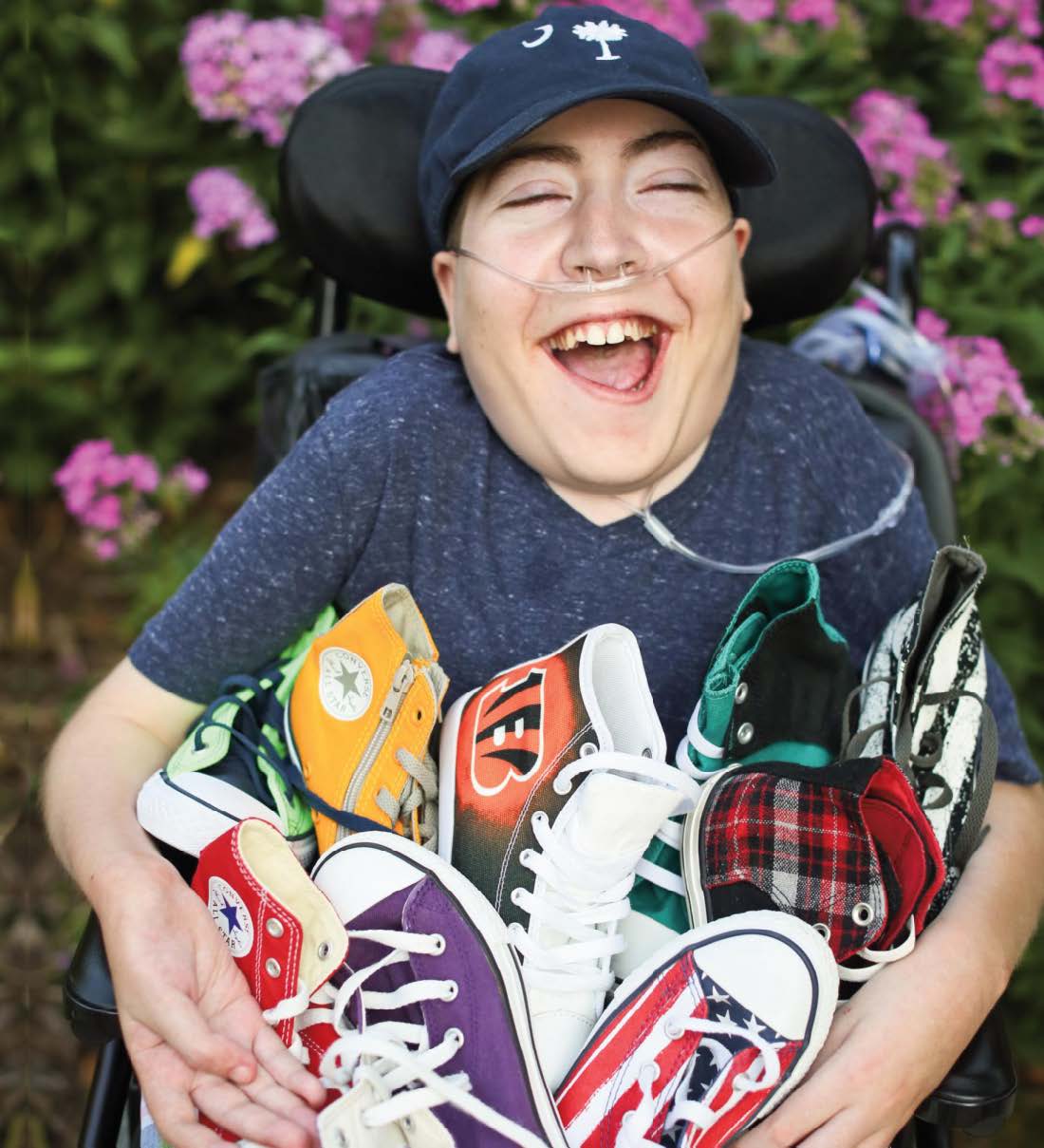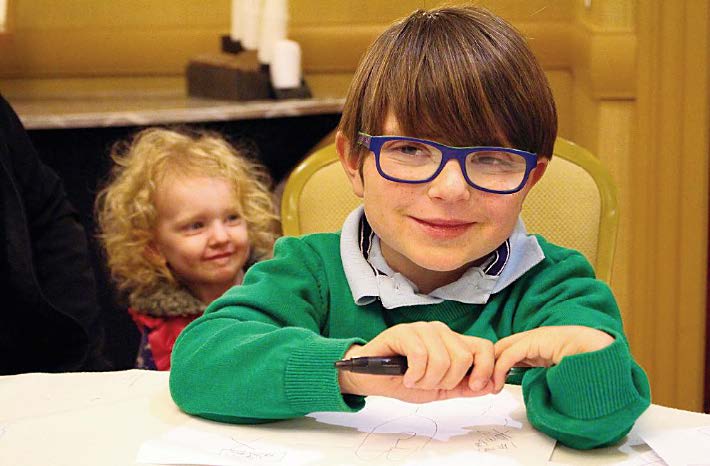
SNEAK PREVIEW: Christopher is a 22-year old who has been cared for by physicians at a children's hospital for his entire lifetime, but that care is at risk now that he is an "adult" who weighs 75 lbs. He is also a big sneaker fan.
The cornerstone of CYSHCNet research is multi-site studies that bring together researchers, community partners, and youth/family research partners from universities and communities nationwide.
Changing How Systems of Care Respond to the Needs of CYSHCN
BY CHARLENE SHELTON, RN, MPA, PHD
CYSHCNet is a network of committed researchers, families, clinicians, and administrative and policy partners who work together strategically to accelerate the generation and application of knowledge needed to best help CYSHCN and their families. We strive to not only conduct nationally-relevant health systems research, but also to increase research capacity by training emerging CYSHCN investigators.
Children and youth with special health care needs (CYSHCN) comprise nearly 20% of children in the U.S., ages 0 to 17. Quality, affordable health care varies from state to state, making the system of health care uneven and difficult to navigate for patients and families.
Because of their frequent use of health services, CYSHCN are particularly vulnerable to shortcomings in healthcare delivery, to medical evidence that doesn't address issues of concern to families, and to fragmentation of health-related policies and services across state, county, and city governments.
To respond to these and other concerns, the Maternal and Child Health Bureau of the U.S. Health Resources and Services Administration (HRSA) has funded a new national research network, CYSHCNet ( CYSHCNet.org), which is poised to change how systems of care respond to the needs of CYSHCN and their families, by bringing meaningful research projects that educate and inform patients, families, and providers about the needs of CYSHCN and their families. CYSHCNet aims to improve the quality of research for this community by establishing a national network of researchers working with CYSHCN, family caregivers, and family-led organizations. The cornerstone of CYSHCNet research is multi-site studies that bring together researchers, community partners, and youth/family research partners from universities and communities nationwide. This approach allows research to reflect the diversity of CYSHCN across the U.S. and address topics of concern to CYSHCN and their families.
Three specific initiatives are at the core of CYSHCNet's work: 1) partnering with youth and family caregivers in every research project; 2) creating a national research agenda; and 3) training emerging investigators through the Guided Research Mentoring Program. Youth and family partnerships in every research project ensures that youth and family leaders have a seat at the table from the time a study is first designed, to ensure that studies are relevant and address the concerns of CYSHCN and their families. Youth and family partners bring a unique perspective to the research process through their lived experiences along with technical expertise in varied fields that improve the study outcomes, eliminate barriers to study participation, and optimize dissemination of findings. Creating a national research agenda will define and prioritize the most important topics as chosen by CYSHCN family leaders and experts in CYSHCN research nationwide. Right now, although the amount of research about CYSHCN is increasing rapidly, there is no coordination or agreement on the most important topics. Training emerging investigators through the Guided Research Mentoring Program aims to increase the pool of CYSHCN researchers. There are relatively few experienced CYSHCN researchers, and this is a hurdle to implementing large, rigorous studies at multiple sites that are needed to have lasting impact on the CYSHCN community. Each year, the Network supports three emerging investigators' one-year studies to help them mature into experienced researchers.
CYSHCNet was in launched in September 2017. In its second year of operation, CYSHCNet is close to announcing its first major product – the CYSHCN national research agenda - which was crafted with the input of nearly 300 health care systems professionals, youth, and families. The research agenda will provide guidance to researchers through prioritization of the most important and timely health care concerns and increase the number, scope, and quality of research projects that focus on improving health systems for CYSHCN. The goal is to improve health systems and health care delivery, increase access to health care for CYSHCN, and expand services for families and caregivers.
With partner organizations in nine states, cluding universities, hospitals, and Family Voices, CYSHCNet has the reach to bring meaningful change to the way health care systems support CYSHCN and their families. The CYSHCNet governing bodies are made up of a who's who of expert CYSHCN researchers, administrators, payment experts, educators, and advocates, many of whom are either parents of CYSHCN or adults with special health care needs. Youth and family leaders are an integral part of the governing committees on equal footing with researchers and other committee members.
Currently there are 10 studies in progress throughout the Network. Studies focus on telehealth, emergency department admissions, transition to adult health care, and the use of multiple medications. The first paper to come out of the Network focuses on opioid prescribing for CYSHCN. Published in the peer-reviewed journal Pediatrics, the study shows that it is common for doctors and dentists to prescribe opioids to CYSHCN, especially when they have more than one disease or condition or take more than one medication.
While much of this may be appropriate, this paper sheds light on what is currently happening so that future work can look more closely at what might need to change.
LEARNING FROM FAMILY STORIES
Among the many tasks that governing committee members perform, an important charge is to help in the collection of family stories. Family stories illustrate the richness of the experience of living with special health care needs and caring for CYSHCN. Through their stories, CYSHCN and their families tell of the challenges of living with special needs as well as the rewards, resilience, and love. Stories are unique to each family, showing how they cope with the health care system, deal with diagnoses, connect with other families, and transition their children to adult services and adult responsibilities. Through an understanding of families' daily struggles, researchers in CYSHCNet see the full picture of how health care impacts CYSHCN and their families on a daily basis. Stories keep us engaged and guard against seeing this research as a purely academic endeavor. Stories also help to connect families with researchers and increase the pool of youth and family leaders who are interested in participating in research activities.

MAN OF THE PEOPLE: Christopher's parents express frustration with systems of medical care that become disjointed once a young adult with special health care needs has to transition to adult services.
The following are examples of stories that families have written to us.
Christopher is a 22 year old with an extremely rare degenerative disease that leaves him a spastic quadriplegic who is oxygen dependent, nonverbal, and g-tube fed. He has been cared for by physicians at a children's hospital for his entire lifetime.
Christopher is followed by 10+ subspecialists, with a history of multiple long inpatient stays. His parents have built relationships with many physicians over the years and this consistency of care has been a lifesaver, quite literally. However, Christopher's streamlined care is at risk now that he is an "adult" who weighs 75 lbs., uses equipment/interventions not commonly used in adult medicine, and needs a Complex Care Clinic to coordinate his care.
Allison Loechtenfeldt, Christopher's mother, wrote his story: one of frustration with systems of medical care that become disjointed once a young adult with special health care needs has to transition to adult services.
Of course, not all CYSHCN have the level of medical complexity that Christopher has. Serena (not her real name) is on the spectrum and generally in good health; however, she receives assistance with her social skills. She sees a therapist and plays body language recognition games at home.
Dealing with the school is a problem because Serena is bullied and has a hard time understanding how to "fit in" better with her peers. The school personnel do not really know how to help Serena, even though they have written recommendations from her therapist and parents. Because Serena is a good student and quite capable of excelling in the classroom, there is a perception that her social skills are a result of her personality or a level of arrogance.
Christopher and Serena's stories illustrate the diversity of the experiences of CYSHCN and demonstrate that CYSHCN frequently encounter issues that aren't addressed by existing evidence and standards. By working in partnership with CYSHCN and their families, CYSHCNet projects can identify issues that have fallen through the divides that exist between the reality of families' experiences and what providers and policy makers understand.
Youth and family partners shape research in three basic ways: planning, implementation, and dissemination. By partnering in planning, youth and family partners help research projects start off on the right foot. Youth and family partners help researchers focus on questions that will have a real impact for CYSCHN and their families. By partnering in implementation, youth and family partners help make research safe, comfortable, and rewarding for research participants as well as helping ensure that research participants represent diversity, spreading the benefits of research findings more evenly through society. By partnering in dissemination, youth and family partners tackle one of the toughest issues facing researchers today: making sure that research findings are applied in practice.
Through collaboration with other research networks, youth, families, funders, and health care providers, studying topics such as those mentioned above, CYSHCNet's reach can extend to all aspects of health care systems. CYSHCNet's focus on multi-site studies and youth and family partnerships will create a better health care landscape for CYSHCN and their families and will help to focus scarce research dollars on the most important topics facing CYSHCN, their families, and clinicians. CYSHCNet brings together top researchers, partners with youth and families, and prioritizes concerns based on the input of CYSHCN, their families, and health care providers in a way that is sure to improve health systems.
This project is supported by the Health Resources and Services Administration (HRSA) of the U.S. Department of Health and Human Services (HHS) under UA6MC31101 Children and Youth with Special Health Care Needs Research Network. This information or content and conclusions are those of the author and should not be construed as the official position or policy of, nor should any endorsements be inferred by HRSA, HHS, and the U.S. Government.•
ABOUT THE AUTHOR: Charlene Shelton, RN, MPA, PhD is the program manager of the CYSHCNet National Research Network and the parent of 2 CYSHCN. She is a medical sociologist and former critical care nurse with master's degrees in policy/nonprofit management and sociology. Her PhD is in Health & Behavioral Sciences from the University of Colorado Denver. All four of her children are grown, so she has spare time to teach medical sociology at Metropolitan State University of Denver, garden, and ski.

SPREADING THE WORD : CYSHCNet SEEKS STORIES
We invite youth and families to contribute their stories and consider being a co-investigator on our research projects. If you have a story to contribute about yourself, your child or youth, or your family, please send it to the National Coordinating Center Program Manager at Charlene.Shelton@UCDenver.edu. Stories should be about 250 words and may include photos. Stories are used in articles like this one and in internal communications, brochures, and the CYSHCNet web site ( CYSHCNet.org). A photo release form and/or permission form will be sent to authors who grant permission to use their real names and photographs.